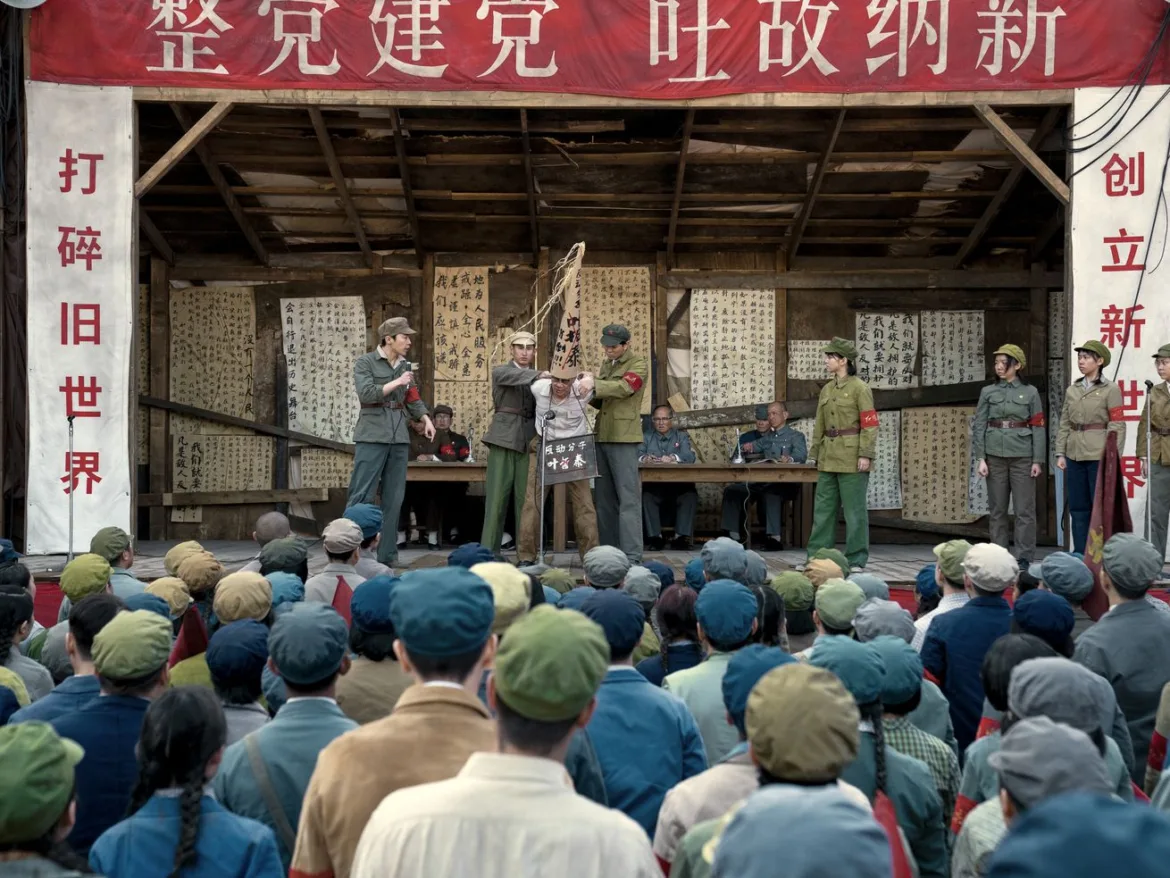It says more about Netflix than it does about China.
Netflix is banned in China — part of the government’s ongoing efforts to limit both foreign influence and Chinese citizens’ access to information about their own country. But that hasn’t stopped Chinese viewers, as well as Chinese state media, from weighing in on its highly anticipated adaptation of the Hugo Award-winning 2008 Chinese sci-fi novel The Three-Body Problem. Many people aren’t happy, yet there’s more to this particular backlash than just fan disgruntlement.
The first of an esteemed trilogy sometimes known as Remembrance of Earth’s Past, the novel The Three-Body Problem is a high-concept fictionalization of a longstanding scientific enigma known as “the three-body problem.” It’s heavy on the science, and author Liu Cixin, a native of mainland China, takes a long view of existential problems that mirror those we’re currently grappling with today, most notably the ethics surrounding our response to advanced artificial intelligence.
One of the novel’s central themes is the question of who gets to decide the future for the rest of humanity. It takes an anti-authoritarian approach that’s bolstered by the author’s experience of authoritarianism in China. One of its central characters functions as a strong critique of the Communist Revolution, and the whole novel arguably critiques the modern-day Communist Party. This critique takes center stage, quite literally, in a controversial opening scene from the book that references a violent period of China’s history rarely shown in China itself.
Despite this, the novel The Three-Body Problem not only cleared China’s broad book ban on anti-government messaging (although before Xi Jinping’s subsequent tightening of censorship across the cultural front) but has become beloved in its home nation. It won multiple awards and gets held up by many as an example of China’s literary excellence and as a major influence in the development of Chinese science fiction. In 2023, another acclaimed and lavish series adapting the book, Three Body, was released by Chinese streaming service Tencent (the show is also currently streaming with English subtitles on Viki; the first two eps are also on YouTube). Three Body has won praise from viewers at home and abroad for staying faithful to the book and its themes; on the popular review forum MyDramaList, for example, the Tencent series has a viewer rating of 8.3/10.
This is important context to understand the conversations that have taken place on Weibo and other Chinese social media platforms since the Netflix adaptation’s release on March 21. As the show continues to dominate Netflix ratings globally, many English-language media outlets have begun covering the “polarised” discussion on Chinese social media around the show — perhaps painting the situation as more complicated than it is. On Weibo, the state-run media account Global Times accused foreign media of inflating the negative reactions to the show in order to foment political drama and make Chinese viewers appear unreasonably nationalist.
It could be easy for an audience unfamiliar with Chinese media to assume that the Netflix adaptation is breaking through Chinese government censorship with a brave, controversial stance on the country’s past — but that’s not entirely true. While the government under Xi Jinping has drastically ramped up its restrictions on speech, this doesn’t paint a fully accurate picture of how everyday people in China interact with those restrictions. What’s fascinating about this 3 Body debate is how much it reveals about how Chinese viewers metabolize culture and cultivate their historical awareness.
Depictions of nationalistic outrage on Chinese social media are probably being exaggerated
The New York Times recently published a news column about it:
“Instead of pride and celebration, the Netflix series has been met with anger, sneer and suspicion in China. The reactions show how years of censorship and indoctrination have shaped the public perspectives of China’s relations with the outside world. They don’t take pride where it’s due and take offense too easily. They also take entertainment too seriously and history and politics too lightly.”
This is certainly a strong argument, and the author, who has spent years reporting from China, including covering its censorship system before, cites examples of criticisms. But a quick Weibo search for “3 body Netflix” shows that it’s not the whole picture; it’s also easy to find Chinese viewers praising the show and criticizing it in equal parts. For example, one recent post celebrates the way the Netflix version has popularized Liu Cixin’s work and Chinese sci-fi to fans around the world. Another post embeds a British vlogger’s commentary on the flaws with the Netflix adaptation, underscoring that criticism of the show is universal.
Most of those criticisms would occur to anyone with a passing understanding of the book. Netflix’s changes make the storyline blander and more inexplicably British, deliberately erasing most of the Chinese characters and relocating the main action to London. The exception to this rule is the subplot surrounding Ye Wenjie, a traumatized scientist who grows up in the shadow of China’s brutal Cultural Revolution. Ye Wenjie is arguably a villain who serves as our primary reference point for understanding China. It’s unsurprising, then, that many Chinese people aren’t happy that an adaptation of a beloved work of Chinese science fiction has erased most of the book’s portrayal of Chinese scientific prowess, relocated the plot to another country, and turned the storyline into something primarily critical of the Chinese government.
The Times piece goes on to suggest that Chinese viewers have a dim grasp of what the Cultural Revolution — the violent decade of Mao Zedong’s rule between 1966 and 1976 — did to the country, but an example from the same column of a widely circulated article critical of the era complicates that point. Information about the Cultural Revolution sometimes does circulate — only to then be restricted:
Someone on social media recently reposted an old article about Ye Qisong, one of the founders of the study of physics in modern China. In 1967, around the time that the struggle session of the series took place, Mr. Ye, who shared the same family name of the physicist in the opening scene, was detained, beaten and forced to confess crimes he didn’t commit. He went crazy and wandered the streets in Beijing, begging for food and money. The article was circulated widely online before it was censored.
This anecdote highlights the complicated relationship between Chinese audiences and their government, which frequently turns thorny despite the best efforts of the CCP to control and censor what media and information citizens have access to.
This goes double when it comes to Chinese historical events. Chinese social media influencers regularly amplify and encourage celebration and commemoration of various historical events, but only as they relate to a vision of a unified China, supporting the social and military goals of the CCP.
Yet this performed patriotism in no way means that Chinese citizens are unaware of the darker parts of their history; witness one Weibo user who described being stunned and impressed by the opening of the Netflix series, with its historically accurate, unflinching depiction of the Cultural Revolution. Such reactions undercut US-centric media’s tendency to pigeonhole Chinese citizens as brainwashed or unquestioning of CCP dogma.
The conflict at the heart of this is arguably China versus its history
In all three versions of the story, the brutality of the Cultural Revolution directly impacts the future of humanity through Ye Wenjie. As a child, Ye Wenjie watches her father, a leading physicist, become a victim of the early Communist Party’s anti-science movement. Because of her association with her father, she’s forced to do years of hard labor, then recruited into a top-secret scientific program. She’s betrayed repeatedly by other people, all of whom are acting under the auspices of the government to entrap and/or spy on her. Over time, her disillusionment with humanity grows to a breaking point that leads her to make a fatal decision on behalf of all mankind.
In other words, the novel and each of its adaptations are clear about the way the Cultural Revolution persecuted the innocent and spawned decades of generational trauma. But each of them portrays the actual violence slightly differently. The English translation of Cixin’s novel opens with an unforgettable scene in which Ye Wenjie’s father is dragged onto a stage before an incensed crowd of communist supporters, pressured by his wife to renounce basic theories of physics, and then beaten to death for his refusal by a group of overzealous teenage party members — all while a horrified Ye Wenjie watches from the audience.
In the original Chinese version of Cixin’s novel, the scene remains entirely the same, but his editor, fearing censorship, asked him to move this section to the middle of the novel rather than the beginning, perhaps hoping that relocating the passage would ameliorate the sting of its criticism. This apparently worked, but when fellow sci-fi writer Ken Liu translated Three-Body into English, Cixin gave him permission to put the passage back at the beginning of the book — which is how millions of readers around the globe experienced it.
The Netflix adaptation follows the English version of the novel: Ye Wenjie’s father is violently murdered before our eyes, and this underpins everything else that happens in the drama.
The earlier 2023 adaptation from the Chinese streaming service Tencent, however, is an almost page-for-page literal adaptation of the English-language version of the novel in every respect except this one. Instead of showing the public execution of Wenjie’s dad, in the Tencent version, he’s arrested and betrayed by members of his own family, and he still loses his esteemed career as a physicist — but he’s ultimately never executed, and it’s implied instead that he died in ignominy with only Ye Wenjie at his side. This is a stark change that arguably waters down the impact of the book, but we still fully understand that the Cultural Revolution victimized Ye Wenjie and her father; decades later, when other characters learn what she went through, they’re appalled. Both the Tencent and Netflix versions faithfully adapt Ye Wenjie’s later harsh life in the labor camp and the subsequent betrayals she experiences.
While the more violent aspects of the regime are often erased, depictions of the bleakness and misguided aims of the Cultural Revolution have become acceptable in Chinese pop culture. For example, last year’s widely acclaimed drama The Youth Memories dealt with the aftermath of the Cultural Revolution on China’s “lost generation,” who were deprived of access to education after the communist takeover. The show takes a lightly but overtly critical stance toward the Revolution’s ban on higher education and treats the lifting of the ban as a major social leap forward.
The problems of Netflix’s 3 Body Problem have more to do with the Netflixian tendency to make every production feel colorless, flat, and forgettable than with Chinese viewers. A look at Tencent’s version, or at shows like The Youth Memories, can give a much more nuanced idea of how Chinese audiences understand their past.



